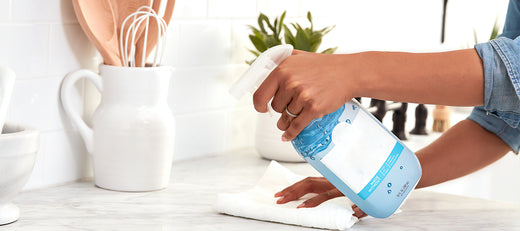
Hidden Dangers in Household Cleaners: What You Need to Know
Keeping your home clean is essential—but could your cleaning supplies be doing more harm than good? Many common products contain harsh chemicals that may affect your health without you even realizing it.
Let’s break down what’s inside these cleaners, what to avoid, and how to switch to safer alternatives.
Toxic Ingredients Found in Everyday Cleaners
Many popular cleaning products are packed with chemicals that can harm your skin, lungs, eyes, and overall health—especially with repeated exposure. Here are some of the worst offenders:
1. Ammonia
Found in: Glass cleaners, all-purpose sprays
-
Ammonia is a corrosive chemical that can cause skin burns, eye irritation, and breathing issues.
-
Mixing it with bleach creates a toxic gas called chloramine, which can be fatal.
-
Always wear gloves and ensure proper ventilation when using products with ammonia.
2. Lye (Sodium Hydroxide)
Found in: Oven cleaners, drain uncloggers
-
Highly corrosive and dangerous when inhaled or touched.
-
Can cause burns, eye damage, or serious harm if swallowed.
-
Always wear protective gear and use with extreme caution.
3. Sulfuric Acid
Found in: Heavy-duty drain cleaners
-
Extremely corrosive and potentially explosive.
-
Can damage skin and eyes on contact and cause severe internal injuries if ingested.
-
Always use with gloves, goggles, and in a well-ventilated area.
4. Air Freshener Additives
Found in: Aerosol sprays, plug-ins
-
Contain chemicals like formaldehyde, p-dichlorobenzene, and aerosol propellants.
-
Linked to skin irritation, allergies, and respiratory issues.
-
Many are also highly flammable.
5. Chlorine & Alkyl Ammonium Chlorides
Found in: Mold/mildew removers, disinfectants
-
Can trigger asthma-like symptoms and irritate airways.
-
Always wear a mask or use safer alternatives when possible.
Support Your Body from the Inside Out
While reducing chemical exposure in your home is a great first step, giving your body the right nutrients can make a big difference too. Explore our collection of premium liquid supplements and vitamins—made for better absorption and better health.
Health Risks Linked to These Chemicals
Prolonged or frequent exposure to these chemicals can lead to:
-
Respiratory problems (especially for those with asthma or allergies)
-
Skin rashes and eye irritation
-
Hormonal disruptions
-
Long-term health concerns including cancer (in extreme cases)
Children and pets are especially vulnerable, making it even more important to be mindful of what you’re using around the home.
Final Thoughts
Are cleaning supplies hurting your health? They can—especially if you're unknowingly exposed to harmful chemicals on a regular basis. But the good news is, safer alternatives are readily available. With a few easy swaps, you can reduce your toxic load and still keep your home sparkling clean.
Stay safe, clean smart, and protect the health of your entire household.


Leave a comment